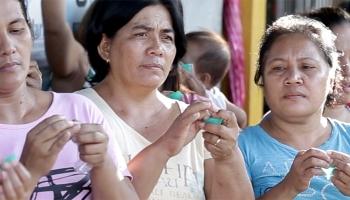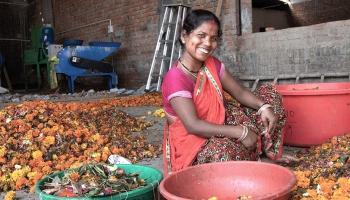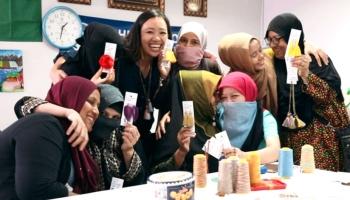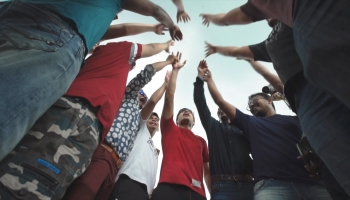Business As Usual? These Entrepreneurs Are a Force for Good
It’s just business — that also happens to transform communities.
It could be a business where every menstrual cup you buy sees one being given away to underprivileged women, so that they no longer have to buy disposable sanitary pads that cost a large portion of their income.
It could be employing marginalised Dalit women to create incense products, made by upcycling discarded flower offerings at temples, which would otherwise be left to pollute India’s rivers.
It could be selling earrings made by women refugees in Malaysia, who are determined to regain self-worth and financial independence after surviving trauma and loss.
Or it could be providing language and training courses to low-wage migrant workers in Singapore, so that they can return home after years of toil armed with new skills to start a business.
These four businesses — Freedom Cups, Phool (formerly known as HelpUsGreen), RWDN and SDI Academy respectively — embody what it means to be a social enterprise.
Social enterprises, which are taking their turn in the spotlight on Social Enterprise Day on Nov 21, thrive not only on profit, but also on tackling unmet social needs and gaps with entrepreneurial zeal.
RECLAIMING THE FUTURE
In the eyes of Sharifah Shakirah, a refugee activist, a pair of earrings is not just a pretty accessory, but also an opportunity to empower.
“By creating financial independence to our women, we are trying to tackle the problems that a community can have, which is domestic violence, child marriage, violence against women,” says Sharifah, who founded RWDN, or Rohingya Women Development Network.
EMPOWERING COMMUNITIES
For Vanessa Paranjothy and her sisters Becky and Joanne, reusable menstrual cups are not only a more sustainable and economical alternative. They also help tackle what is known as “period poverty”, where women are disadvantaged by a lack of access to sanitary products.
“The very basic aim of Freedom Cups is to start a conversation. We need to start a conversation about periods, about women’s bodies and how it affects gender equality, health and sanitation, and well-being and development,” says Vanessa.
RESTORING DIGNITY AND THE ENVIRONMENT
Clean up rivers and empower low-income Dalit women to boot? Ankit Agarwal made that a best-selling reality when he set up Phool with a childhood friend, but it’s the lives they’ve transformed that remain core to the business.
Noting that Dalits face heavy discrimination in India, Ankit says: “When [the women] start working with us, there's a perspective change that happens. They feel more confident about themselves. So it is not only about financial livelihoods, but also about dignity and respect.”
Adds Ranjana, one of the women employed by Phool: “If every employer opens a factory like this and starts to change things, change will definitely come in society.”
TRANSFORMING LIVES
And while few would think of educating low-wage migrant workers with language and business skills as a viable business, Sazzad Hossain has set out to do just that, with SDI Academy.
Referring to migrant workers’ lack of access to opportunities in Singapore, Sazzad says: “How can we give them a simple skill, that will help them solve their own problems, because that is more sustainable.”
IN THE BUSINESS OF DOING GOOD
For these businesses, there’s more than one bottomline. Besides the financials, success is also measured by social and environmental results.
This enlightened approach is yielding dividends. By reinvesting in the communities they support, the people they have helped are empowered to reinvest in their future. “If our girls and women are uneducated and unable to contribute along with the men, the atrocities that we are facing will not end,” says Begum, one of the women trained and supported by RWDN.
“I can earn about RM500 to RM600 (US$121 to $145) monthly from the handicraft skills that I know now. I am also able to teach my skills to other women. I want my two daughters to follow my way and become empowered like me.”
Freedom Cups and SDI Academy are among the past winners and alumni respectively of Singapore International Foundation’s Young Social Entrepreneurs programme. Through mentorships, study visits, and opportunities to pitch for funding, the programme nurtures social entrepreneurs of different nationalities, to drive positive change for the world.
About Meet the Businesses Doing Good
ABOUT FREEDOM CUPS
From Nigeria to Nepal, Freedom Cups and their buy-one-give-one model has travelled far since the Singaporean social enterprise was formed in 2015. Unlike single-use sanitary napkins and tampons, each cup lasts up to 15 years. This helps ease a financial burden for women from underprivileged communities, whom they give the cups to.
ABOUT PHOOL
Phool is a social enterprise that collects about eight tonnes of waste flowers from temples daily, to recycle them into eco-friendly products - which are handcrafted by women from Dalit and other marginalised communities, providing them with fresh livelihoods. It plans to employ 3,700 women by 2020 and recycle 50 tonnes of flowers daily.
ABOUT RWDN
The Rohingya Women Development Network (RWDN) is Malaysia’s first women-led group for Rohingya refugees. Started in 2016 by Sharifah Shakirah, a Rohingya refugee, RWDN runs programmes that aim to empower Rohingya women. These include English and Quran classes and livelihood skills training. By teaching women to harness their abilities, RWDN provides them with opportunities to lead, to stand up for their rights and to achieve financial independence in an otherwise patriarchal community.
ABOUT SDI ACADEMY
SDI Academy is a social enterprise that champions migrant worker rights and welfare through access to education, livelihood classes, and activities to encourage social inclusion. By empowering them with language, vocational and entrepreneurship skills, SDI aims to improve their employment prospects, and equip them with the knowledge and tools to start their own ventures when they return home. Present in four countries, its outreach efforts also include foreign domestic workers and refugees.







